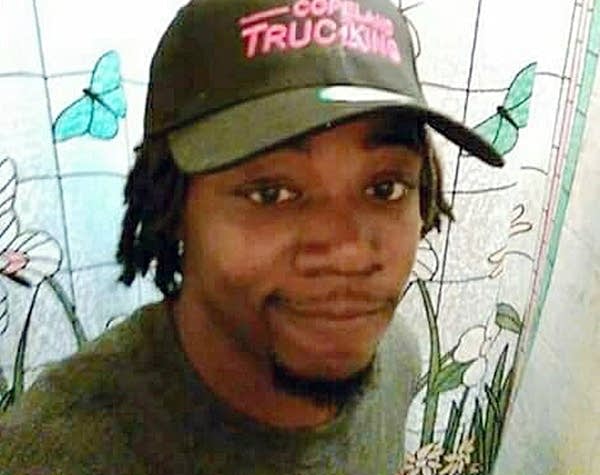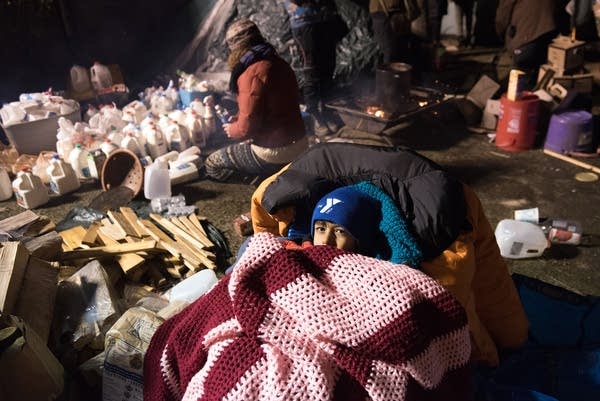Mpls. police: Internal probe clears cops in Jamar Clark shooting

Go Deeper.
Create an account or log in to save stories.
Like this?
Thanks for liking this story! We have added it to a list of your favorite stories.
Updated: 7:11 p.m. | Posted: 2:40 p.m.

The two Minneapolis officers involved in the Nov. 15 shooting of Jamar Clark did not violate police department policy during their confrontation with Clark and will not face discipline, Police Chief Janee Harteau said Friday.
After reading the findings of an internal affairs investigation by the department, Harteau told reporters she concluded the use of deadly force by officers Mark Ringgenberg and Dustin Schwarze was necessary.
Turn Up Your Support
MPR News helps you turn down the noise and build shared understanding. Turn up your support for this public resource and keep trusted journalism accessible to all.
"I can say with absolute certainty that I fully support the actions of officers Ringgenberg and Schwarze" that night, she said. "These officers did not dictate the outcome of this incident. This was an outcome that no one wanted."
Minneapolis NAACP President Nekima Levy-Pounds said the decision is troubling.
"The reality is the result of this decision sends the message to police officers that they can kill unarmed people with impunity and that is dangerous for all people in the state of Minnesota to have to contend with," Levy-Pounds said.

The confrontation that led to Clark's death began when police were called by paramedics who said Clark was interfering with their efforts to treat an assault victim. Ringgenberg and Schwarze responded.
Clark refused orders to take his hands out of his pockets, according to the Minnesota Bureau of Criminal Apprehension's investigation.
The officers tried to handcuff him but failed. Ringgenberg wrestled Clark to the ground but wound up on his back atop Clark and felt Clark's hand on his weapon, according to the BCA.
Schwarze then shot Clark, 24, in an encounter that lasted barely more than a minute from the time officers first arrived.
Police union president Bob Kroll said the department's finding was correct.
"I think the chief did a very good job articulating that it was a thorough investigation," Kroll said, "and the officer's actions were lawful and proper, which I've been saying all along."

The shooting and its aftermath pushed Minnesota into the center of the painful national debate over the relations between police and people of color and the use of deadly force.
Waves of angry protests followed as activists claimed police brutality and demanded the officers face criminal charges. Protesters camped for weeks outside the 4th Precinct police station in north Minneapolis with tensions often high.
Ultimately, the officers were cleared of any criminal wrongdoing.
In March, Hennepin County Attorney Mike Freeman declined to file criminal charges against the officers and said the use of deadly force was justified. He cited forensic evidence in the BCA investigation that found no bruising of Clark's wrists that handcuffs would likely have caused and evidence of Clark's DNA on Ringgenberg's gun.
In June, a United States Justice Department investigation concluded that there was insufficient evidence to prove beyond a reasonable doubt that the officers willfully violated Clark's civil rights.

With the county attorney declining charges and the Justice Department concluding there were no civil rights violations, the remaining question was whether Ringgenberg and Schwarze would face discipline from within the department.
Harteau in March said the department would examine the force used by the officers that night, including the maneuver Ringgenberg used to take down Clark.
Schwarze had grabbed Clark to handcuff him, but couldn't. Ringgenberg then used the takedown maneuver — reaching his arm around Clark's chest and neck — and took him to the ground.
On Friday, Harteau said the takedown maneuver was not a choke hold as some had claimed and that "while this may not be a specific technique the MPD instructs, that does not mean it was unauthorized."
She said Clark's DNA on the gun and the forensic report that showed no evidence he was handcuffed led her to conclude the use of deadly force was warranted and that Schwarze believed Clark either had possession of Ringgenberg's gun "or would imminently be in possession of the officer's handgun if not stopped immediately."
Harteau acknowledged the incident and the fallout from it had been hard on the department, the officers, the community and on Clark's family. She said she'd spoken earlier to Clark's family.
Minneapolis Mayor Betsy Hodges acknowledged that some people would be upset and how painful it was for Clark's family.
"I extend my condolences to all of them for their grief," Hodges said. "This has also been a painful time for the two officers and their families. To them I also offer my hope for healing."
The ACLU of Minnesota slammed the decision not to discipline the officers.
"We are deeply troubled that Officers Riggenberg and Schwarze will not be held accountable for their actions that led to the killing of Jamar Clark," Charles Samuelson, the Minnesota ACLU's executive director, said in a statement.
"This was the final opportunity for the officers to be held accountable for their actions," he said. "This sends a chilling message to all Minneapolis police officers that the next time they confront a similar situation they should take another life."
Clark relative Kenya McKnight-Ahad called the decision disheartening and said police department policies don't value black lives.
"We've got to move beyond no policy or practice was violated based on the structure and the way we have it," she said. "We've got to move to a place where we are reforming policies and practices."


